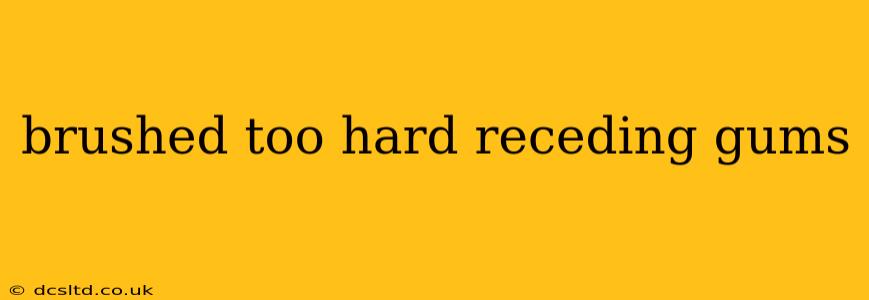Brushing your teeth is crucial for maintaining good oral hygiene, but aggressive brushing can have detrimental effects. Many people find themselves facing the issue of receding gums, often as a direct result of brushing too hard. This comprehensive guide explores the causes, prevention, and treatment options for receding gums associated with overly vigorous brushing.
What Causes Receding Gums from Brushing Too Hard?
Aggressive brushing, characterized by harsh scrubbing and excessive pressure, damages the gum tissue surrounding your teeth. This damage leads to gum recession, exposing more of the tooth's root. The abrasive action of the toothbrush, combined with forceful brushing, wears away the enamel and exposes the underlying dentin, making teeth more sensitive. Over time, this continuous trauma weakens the gum line, resulting in noticeable gum recession.
How Can I Tell if I'm Brushing Too Hard?
Recognizing if your brushing technique is contributing to gum recession is crucial for preventing further damage. Here are some telltale signs:
- Bleeding gums: While occasional bleeding might be normal, frequent bleeding during brushing is a clear indication of aggressive brushing.
- Gum sensitivity: Increased sensitivity to hot, cold, or sweet foods and drinks often accompanies gum recession.
- Visible receding gums: You may notice a change in the appearance of your gums, with more of your teeth showing than before. The gums might appear pulled back from the teeth.
- Loose teeth: In severe cases, gum recession can loosen teeth as the supporting structures weaken.
What are the Long-Term Effects of Receding Gums?
Receding gums are not merely an aesthetic concern; they pose significant risks to your oral health. The exposed tooth roots are more susceptible to:
- Increased tooth sensitivity: Dentin, the layer under the enamel, lacks the protective layer of enamel and is more sensitive to temperature and pressure changes.
- Tooth decay: The root surface is more vulnerable to cavities as it lacks the protective enamel.
- Gum disease (periodontitis): Receding gums can progress to periodontitis, a severe gum infection that can lead to tooth loss.
- Tooth loss: In advanced cases, severe gum recession can compromise the structural support of the teeth, leading to loosening and eventual loss.
How Can I Prevent Receding Gums Caused by Brushing?
Preventing gum recession involves adopting a gentle, effective brushing technique:
- Use a soft-bristled toothbrush: Hard bristles are more likely to damage gums.
- Brush gently with short, gentle strokes: Avoid scrubbing or sawing motions. Focus on gentle back-and-forth movements along the gumline.
- Brush twice a day for two minutes: Consistency is key, but aggressive brushing negates the benefits.
- Angle your brush at a 45-degree angle: This directs the bristles under the gumline, effectively removing plaque without damaging the gums.
- Don't brush too frequently: Over-brushing can be just as damaging as aggressive brushing.
What Treatments are Available for Receding Gums?
While prevention is the best approach, if you already have receding gums, various treatments are available:
- Scaling and root planing: This deep cleaning procedure removes plaque and tartar from below the gumline.
- Gum grafts: This surgical procedure involves transplanting gum tissue from another area of the mouth to cover the exposed roots.
- Guided tissue regeneration: This procedure utilizes special materials to stimulate the regrowth of gum tissue and bone.
Can Receding Gums Be Reversed?
The extent to which receding gums can be reversed depends on the severity of the recession. Minor gum recession might be improved through improved brushing techniques and professional cleaning. However, more severe cases often require surgical interventions like gum grafts to restore the gum line.
What if My Gums are Receding and Bleeding a Lot?
If you're experiencing significant gum recession and bleeding, it's crucial to consult a dentist or periodontist immediately. They can accurately diagnose the underlying cause and recommend the appropriate treatment plan. Don't delay seeking professional help. Early intervention is crucial in managing and preventing further gum damage.
Are there any home remedies for receding gums?
While home remedies might offer some temporary relief from symptoms, they cannot reverse receding gums. Focus on improving your brushing technique and maintaining excellent oral hygiene. Consult your dentist for appropriate treatment options.
This information is for educational purposes only and does not constitute medical advice. Always consult a dentist or periodontist for diagnosis and treatment of receding gums.
